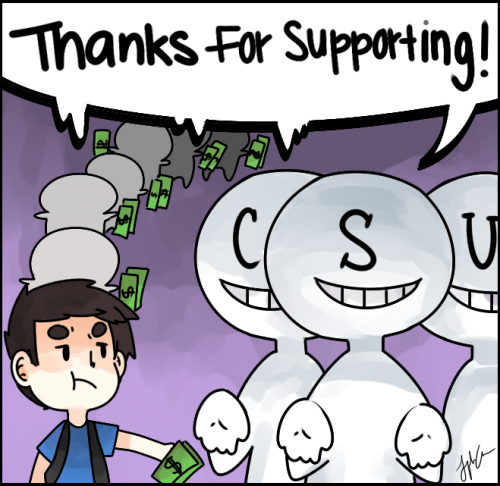Student Success Fees or Failure Fees?
JACQUELYN LOI
BRIANA THAI
Staff Writers
California budget cuts have been an ongoing problem that have caused class sizes to increase, courses to be cut and a rise in college tuition. As a result, many California State Universities (CSUs) have considered implementing student success fees that would provide financial support to places around the campus that have a significant impact on a student’s retention and graduation. CSUs, such as Fullerton, Dominguez Hills, Fresno and San Diego, all have student success fees, which range from $200 to $500 each semester. These fees can add up to about $1000 a year. Student fees are an attempt to shift more education costs to students without increasing tuition.
Student success fees can provide more course selections, more academic support and recreational opportunities. Some ways to utilize the fee include expanding library hours and resources, enabling Wi-Fi across the campus or hiring more faculty members. If colleges are able to prove they can remain financially durable in tough economic times, donors will be more likely to donate more money to colleges. With success fees, CSUs will have extra money and can use it to help students be successful.
However, there is no guarantee regarding what the money will be used for, as what it will be invested in is determined by each individual campus. Some colleges have implemented the fees, yet have not changed the campuses at all. Classrooms are not updated with the latest technology or more faculty members as promised. In fact, according to San Jose Mercury News, San Jose State has spent nearly 40 percent of their success fees on athletics, something hardly mentioned in the priorities presented.
Many students from different campuses have protested against these fees, saying that they should rollback the success fees, but CalPoly president Jeffrey D. Armstrong had announced that success fees began in the fall semester of 2012, according to CalPoly News. By the fall semester of 2014, 11 of the 23 CSU campuses will charge these fees.
Student success fees are merely an inconspicuous way of increasing the costs of attendance. These fees are shifting more costs to students for fundamental educational services that should be included in their tuition. Many students are struggling to afford college itself, and the addition of the fee will have them suffer more, which may cause college students to drop out. Many students are already in debt and may have to struggle to pay for the extra fees as well. Some college students have part time or full time jobs and the new added fees may cause them to put in even more work hours which may then cause a higher risk of lowering their grades. Some high school graduates may not even be able to attend college because of rising tuition costs. Success fees only help students who can afford the tuition and the additional fee.
Even though these fees allow more money to be spent on students, what is not determined is the priority of classes or departments that the money will be spent on. By allowing this bill to pass, CSUs are shown that college students are willing to pay more for education and this may be taken advantage of in the near future. Is it really worth it to pull out more loans and be in debt to get your diploma?
